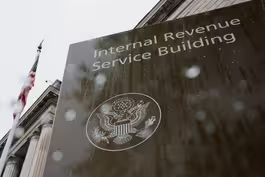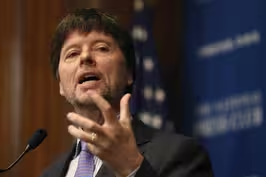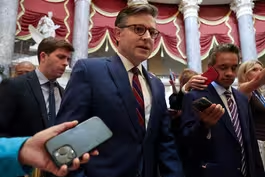
A look at the stability of Syria's new government
Clip: 7/17/2025 | 9m 33sVideo has Closed Captions
Amid a violent week in Syria, a look at the stability of the new government
In Syria, violence continued between rival factions even after a ceasefire deal. Government troops withdrew overnight from a region as Israel said it would not allow Syrian forces south of Damascus, extending its attempted control of the area. Stephanie Sy reports on the new nation's fragile stability.
Problems playing video? | Closed Captioning Feedback
Problems playing video? | Closed Captioning Feedback
Major corporate funding for the PBS News Hour is provided by BDO, BNSF, Consumer Cellular, American Cruise Lines, and Raymond James. Funding for the PBS NewsHour Weekend is provided by...

A look at the stability of Syria's new government
Clip: 7/17/2025 | 9m 33sVideo has Closed Captions
In Syria, violence continued between rival factions even after a ceasefire deal. Government troops withdrew overnight from a region as Israel said it would not allow Syrian forces south of Damascus, extending its attempted control of the area. Stephanie Sy reports on the new nation's fragile stability.
Problems playing video? | Closed Captioning Feedback
How to Watch PBS News Hour
PBS News Hour is available to stream on pbs.org and the free PBS App, available on iPhone, Apple TV, Android TV, Android smartphones, Amazon Fire TV, Amazon Fire Tablet, Roku, Samsung Smart TV, and Vizio.
Providing Support for PBS.org
Learn Moreabout PBS online sponsorshipWILLIAM BRANGHAM: Today in Syria, violence continued between rival factions even after a cease-fire deal happened yesterday.
Government troops withdrew overnight from Suwayda, as Israel said it would not allow Syrian forces south of Damascus, extending Israel's attempted control of that area.
Stephanie Sy updates the situation and then looks at this new nation's fragile stability.
And a warning: Images in this report may disturb some viewers.
STEPHANIE SY: Today in Southern Syria, a massacre.
Armed Druze militias chased, tortured and killed bedouin tribe members, including women and children, an act of apparent vengeance after bedouin attacks on Sunday escalated into conflict.
The brutality comes despite a fragile cease-fire agreement signed yesterday between the Syrian government, the Druze union and local tribal leaders in Suwayda.
But the conflict is not just local.
Israeli strikes Wednesday on the presidential palace and Defense Ministry headquarters in Damascus raised the stakes.
Today, U.S. State Department spokesperson Tammy Bruce said the U.S. did not support those strikes.
TAMMY BRUCE, State Department Spokesperson: The United States unequivocally condemns the violence.
All parties must step back and engage in meaningful dialogue that leads to a lasting cease-fire.
STEPHANIE SY: The U.S. has supported the interim Syrian government led by Ahmed al-Sharaa, a former jihadist who has promised peace.
Ten days ago, the U.S. lifted its terrorist designation on Hay'at Tahrir al-Sham, his former armed rebel group, now part of the interim government.
And in may, al-Sharaa met with President Trump a day after Trump lifted sanctions on Syria.
An array of groups hold sway in the country, in the Northeast, the Kurdish Syrian Democratic Forces supported by the United States.
And, in the northwest, swathes of territory are controlled by Turkish-backed militias.
Other opposition groups hold pockets of power in the south, and Israel occupies and controls the Golan Heights.
Since the new interim government came into power in late March, instability has been rife.
The nation's many factions and tribes have come head-to-head.
In March, 1,500 Alawites, a religious minority that once controlled Syria under the 50-year Assad family dictatorship, were slaughtered by forces of the new government, this after former officers loyal to ousted President Bashar al-Assad attempted a coup in Latakia, once the Assad dynastic power base.
And while interim Syrian President Ahmed al-Sharaa denounced the killings and vowed justice, his own government has been criticized for aiding and abetting Syria's instability.
Today, al-Sharaa promised to protect the Druze.
AHMED AL-SHARAA, Syrian President (through translator): I also address the Druze people.
We assure you that protecting your rights and freedom is one of our priorities, and we reject any effort that aims to drag you to an external party or to create division within our ranks.
STEPHANIE SY: But longstanding divisions continue to threaten Syria.
After today's bloodshed, the bedouins have already vowed another round of revenge.
To break down the recent developments in Syria and its regional and geopolitical implications, let's turn to Hassan Hassan, a longtime Syrian analyst and the founder and editor in chief of "New Lines" magazine, joining us today from Virginia.
Hassan, it's great to have you on the "News Hour."
I want to jump right in to what triggered the appalling violence we're seeing in Suwayda, where clashes erupted between these Druze militias and Sunni bedouin tribes.
What started this?
HASSAN HASSAN, Editor in Chief, "New Lines": So this was a long-simmering problem in Syria over the past few months, but what happened this time is that Israel poured gas into it, basically.
Over the past few months, especially over, like, the past seven months, since the Assad regime fell - - this is a regime that ruled Syria for almost 60 years -- the new government controlled most of Syria, except for four provinces.
One of these is closer to Israel, and it's dominated by the Druze.
And those refused to be part of the government.
There is one Druze leader backed by Israel who refused basically to be part of the new government, considered the kind of an extremist government, and he refused to be part of that.
And that was the source of tensions that kind of triggered many incidents of violence over the past seven months.
STEPHANIE SY: Right.
So, Israel, though, says they are there, they bombed Damascus yesterday to protect this Druze minority.
Do they have other reasons for why they would target Damascus and want to see this government that is still trying to consolidate and unify Syria, which isn't easy, do they have other reasons to want that destabilization?
HASSAN HASSAN: Israel does, yes.
So Israel has its own reasons.
It has been concerned about this new regime in Syria in regards to the jihadists, a jihadist-dominated regime, because the current president is a former jihadist.
So Israel thinks that it has security concerns, that it cannot trust this new regime.
They think that this regime backed by Turkey in Syria is basically a future threat that Israel cannot just allow to stabilize the country and control the whole country for the long run.
STEPHANIE SY: On the other hand, Hassan, the transitional government itself led by President al-Sharaa has been accused of its treatment of the Druze minority.
And we just talked about in the piece about a massacre against the Alawites a few months ago.
HASSAN HASSAN: So, in both cases in March, when incidents happened or clashes between the Syrian government or pro-government forces in the coastal region, the western region of Syria, and now in the southern parts of Syria against the Druze, or between the Druze and the government, both incidents were triggered, objectively speaking, by the Alawites and the Druze.
But the violence perpetrated against the Alawites and the Druze have raised concerns about how the new government treats minorities.
This is a real concern for both Syrians and for outsiders, especially that many of these atrocities, at least according to the government, are committed by pro-government forces that are -- tend to be radical extremists, and they don't follow the orders, the orders from Damascus.
STEPHANIE SY: And yet there are a lot of international players, including the United States government, continuing to support the interim government and al-Sharaa.
Is the violence that we have seen in the last few days, Hassan, existential to his ability to hold the country together?
HASSAN HASSAN: Personally, I don't think these - - the problems in Suwayda with the Druze or even in the coastal region with the Alawite, are existential problems for the new order in Syria.
The majority of Syrians, they believe that the return of the Assad regime or a new order that doesn't -- that's not Sunni-dominated will not be accepted.
So I don't think it's an existential threat in that sense, except if Israel and -- or the Israeli policy becomes the U.S. policy.
For example, that's when Damascus starts to be worried.
Over the past seven months, they -- the authorities in Damascus have tried to engage in peace talks.
Despite a push sometimes, for example, from Turkey to attack the Kurdish-dominated area and retake it by force, Damascus has tried to say, no, let's talk with them and kind of try to peacefully integrate these forces into the government.
Even what's happening now, it's a mix of old problems with new complications and then you have regional interests.
What happened in favor of Damascus, the new regime in Syria, is that almost all countries have supported their stability.
And the U.S., Europe, Russia, even in Iran and others will -- all have said the right things in terms of, our interest in is in stabilizing Syria and supporting this government.
But this government has to act and behave like a government that represents all Syrians.
STEPHANIE SY: That is Hassan Hassan of "New Lines" magazine.
Hassan, thank you for your insights.
HASSAN HASSAN: Thank you for having me.
'Dear America' writer describes process to become documented
Video has Closed Captions
Clip: 7/17/2025 | 7m 20s | Jose Antonio Vargas updates 'Dear America' to describe the process to become documented (7m 20s)
IRS to share personal data with immigration agents
Video has Closed Captions
Clip: 7/17/2025 | 5m 40s | IRS to share personal data with immigration agents to aid deportation efforts (5m 40s)
Planned Parenthood CEO on blocking it from Medicaid funding
Video has Closed Captions
Clip: 7/17/2025 | 6m 43s | Planned Parenthood CEO says blocking it from Medicaid funding is 'devastating to patients' (6m 43s)
'We will continue': Ken Burns calls PBS cuts shortsighted
Video has Closed Captions
Clip: 7/17/2025 | 7m 41s | Ken Burns calls public media funding cuts 'shortsighted,' but vows 'we will continue' (7m 41s)
What's set to be cut as rescissions package nears approval
Video has Closed Captions
Clip: 7/17/2025 | 8m 8s | The programs facing funding cuts as rescissions package nears final approval (8m 8s)
Providing Support for PBS.org
Learn Moreabout PBS online sponsorshipSupport for PBS provided by:
Major corporate funding for the PBS News Hour is provided by BDO, BNSF, Consumer Cellular, American Cruise Lines, and Raymond James. Funding for the PBS NewsHour Weekend is provided by...
















